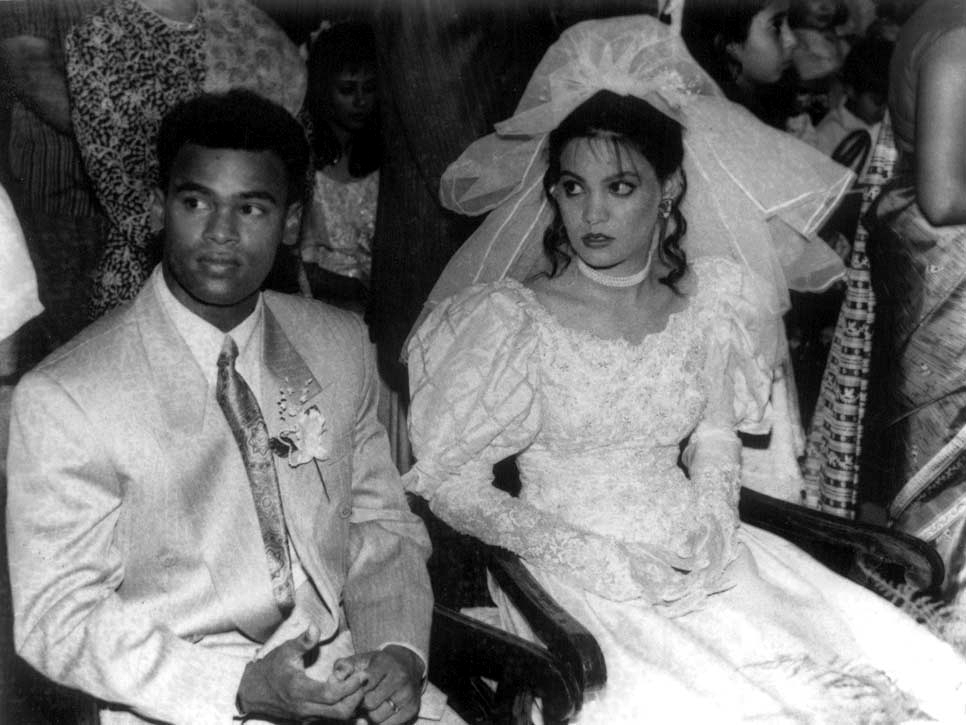
Did the fact that you and your husband, Vinod, hail from different communities ever intrude in your initial involvement with each other that finally led to marriage?
During the initial stages of involvement I did have apprehen-sions in my mind such as, “How would we adjust since our backgrounds are very different, i.e. he’s a Marathi Hindu and me an Anglo–Indian Christian”.
How did you meet?
I was working as a receptionist at Hotel Blue Diamond (in Pune) and Vinod was staying there as he had come to Pune to play a match at Nehru Stadium.
Several years down the line, how do you feel today about couples opting for such relationships, marriages? What is your message to them?
The need of the hour for this ‘pseudo–secular’ country are inter–caste, inter–religious marriages wherein love for one another is the binding factor in the marriage and not common religions and wherein each of the partners is allowed to practice his and her own religion (no post marriage conversions). And the children born out of such wedlock should be taught the values of both the religions. They will eventually be one and the same as all religions preach love, tolerance and service to humanity. This is our message to such couples.
Is it more exciting the fact that two persons from different religio–cultural back-grounds get together or do the difficulties begin to take over? What was the attitude of your respective families to your decision?
The highs and lows in such marriages are the same as one would find in other “regular” marriages. It is definitely more exciting as everyday one is learning the values and teachings and rituals of another religion. And this desire to learn stems from love for your spouse and not any matrimonial compulsions.
There never was any opposition from either of our parents.
How did you marry? Which ceremony? And do you have children? If so, what are their names? How did you choose their names? What about the choice of religion for them? What are your views on this even if you do not have any children?
No issues as yet! We’ve decided to give them English names. If it’s a boy then Adrian, or Joshua, or Neil. If its a girl then Malaika, or Johaina. We’ll teach them about both the religions. And as adults they can, if they so desire, pick or choose.
Today’s India is much more intolerant. Some political parties are making it a point to prevent such matches. Does it bother you that if things keep on going like this, future generations/your children may not have the same freedom of choice as you and Vinod exercised?
This issue you’ve raised, though this question is, at present, disturbing, we are not necessarily losing sleep over it. I believe that everything in this universe, in nature, follows a cycle, a circle wherein there are highs, the midpoints and the absolute lows. Today’s communal scenario depicts the absolute low, the nadir of the cycle/the circle.
Things I believe are at their very worst but from hereon things will start looking up – the darkest how is just before the dawn. We Indians have the moral strength to step out of this ‘man–made’ quagmire. A recent example of this is the non–reaction of the common man to the release of the Shrikrishna Commission’s report. It speaks volumes about the secular maturity attained by the citizenry.
Food and faith. How have you surmounted these differences?
Yes, we’ve surmounted the difference of food and faith because love surmounts all obstacles.
How religious are you and your husband? How do you celebrate the different festivals of your different faiths?
We both are very religious but not in the ‘iron-clad’ sense of the word. We try to be humanitarians who try to give back to this world what God has given us in such abundance. We celebrate Diwali, Ganesh Chaturthi by installing a Ganesh idol in our house, Easter and X’Mas.
